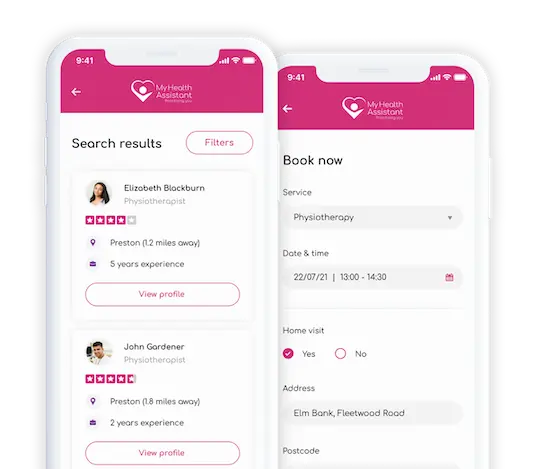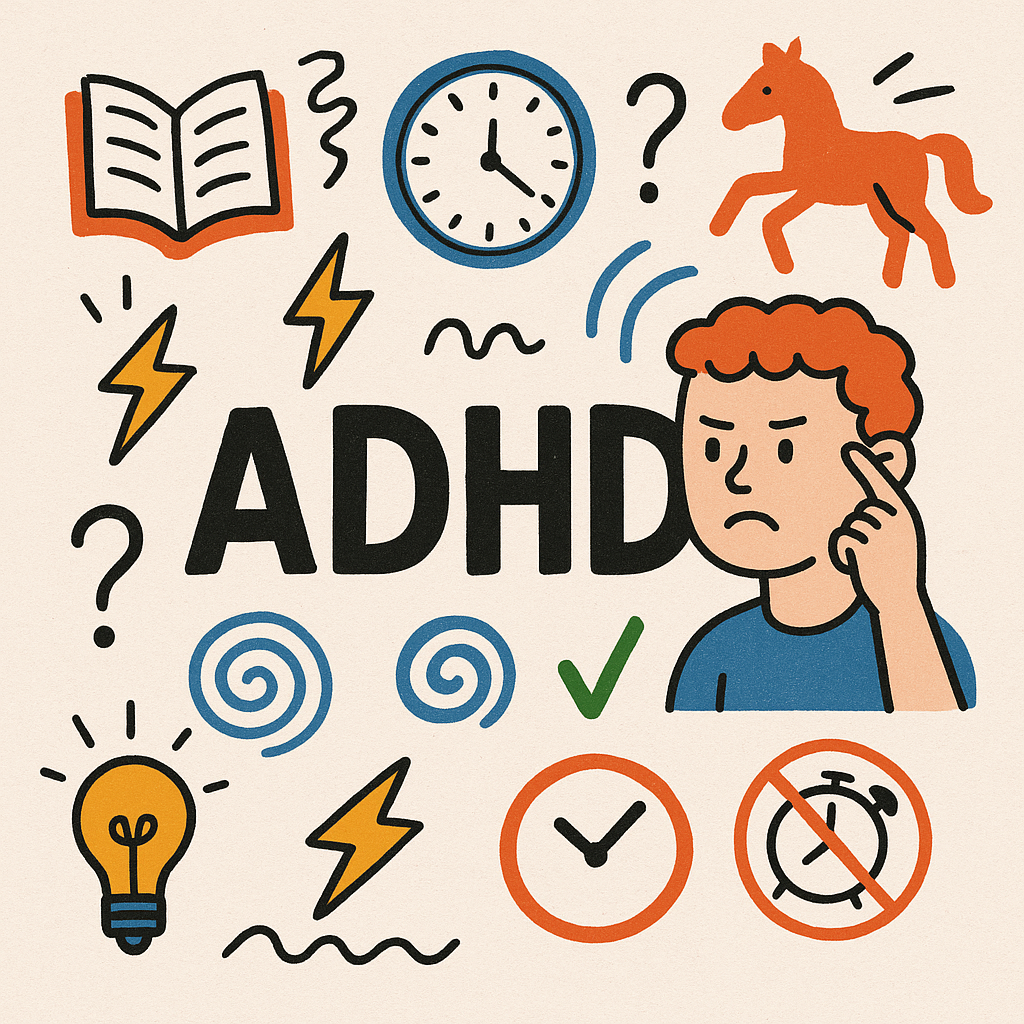My Health Assistant provides easy access to affordable healthcare services and treatment options, enabling you to take control of your health and decide on the best option for you.

With My Health Assistant, you can search for local healthcare services or book consultations and appointments online at any time.
Review a variety of profiles and choose somebody you will feel most at ease with, and who can best meet your needs.
Connect with local healthcare services and discuss the options for your treatment so you can decide what’s best for you.
It’s easy to tailor your search to match your exact needs, but if you are unsure on what service you require, you can contact one of the My Health Assistant team who are caring, approachable and supportive towards you and your needs. Our UK-based advisors are on hand to support you over the phone or online, so you never have to feel like you’re on your own.
Search for healthcare services and treatment options
My Health Assistant is for anyone looking to book treatments directly with a private medical or health specialist in their local area. We don’t have any criteria and you don’t need to qualify your healthcare needs to use My Health Assistant. My Health Assistant enables you to take control of your health.
Sign up now
My partner identified a growing mark on his leg that despite three visits to his GP remained undiagnosed. After seeking help through a private medical practitioner, he received a swift diagnosis of early-stage skin cancer and was given the treatment he needed.

My mother began to lose her hair at 59 years old. It took many months to get appointments with her local GP and most treatments were not covered on the NHS. Frustrated at the slow progress she eventually decided to go private, getting immediate treatment of her choice and building her confidence back.

My four-year-old daughter struggles with clothes. She has hypersensitivity which affects her everyday life. We knew something wasn’t right but didn’t know who to speak to. After going private she was diagnosed with ADHD and sensory processing disorder. This enabled us to understand how to deal with her to support her and get the right professional support.

I felt stuck in a cycle of working in a job I didn’t enjoy just to pay my bills, and it was getting me down. I needed to make a change but didn’t know where to start. With the support of a life coach, I managed to build my confidence and focus on the type of opportunities I needed to further my career, doing something I love. Now, not only do I enjoy my work, the earnings and opportunities are endless. Having a focussed external view was exactly what I needed to support me in taking the steps I needed into a new career.
Download the My Health Assistant app to book appointments in just a couple of taps. You can manage yours and your family’s appointments on the go and make bookings no matter where you are. We put your healthcare in your hands, allowing you to take control of your health at the click of a button.


Living with ADHD as an adult can be a challenging and sometimes isolating experience. Navigating daily routines, managing time, and staying organised may feel overwhelming, even when you’re putting in your best effort. The good news is you’re not alone, and there are practical solutions that can make a real difference. One approach gaining attention and delivering genuine results is ADHD coaching. Whether you're exploring options beyond the NHS or simply curious about what coaching could offer, this guide will help you understand your choices and feel more empowered about your next steps.Understanding ADHD Coaching ADHD coaching is a personalised, practical form of support that helps you develop effective strategies for managing symptoms. Unlike therapy—which often delves into emotional and psychological patterns—ADHD coaching focuses on building skills and boosting confidence in your day-to-day life. Your coach acts as a collaborative partner, helping you: Set achievable goals tailored to your needs Break down overwhelming tasks Develop routines and structures that work for you Build self-awareness and self-advocacy skills Stay accountable and celebrate your progress The process is forward-looking and practical, designed to help you thrive, reduce stress, and make day-to-day life more manageable.Does Coaching Help ADHD? Absolutely, coaching can be a transformative resource for many people with ADHD. Research and personal stories alike show that working with an ADHD coach can help improve organisation, time management, decision making, and emotional regulation. What sets coaching apart is its empowering nature. Rather than focusing solely on challenges, a coach works with you to harness your strengths and find what genuinely works for you. Many people find they gain a new sense of control and confidence, often feeling understood and supported for the first time. Remember: ADHD isn’t a character flaw—it just means your brain processes information differently. With the right support, your unique qualities can become assets, not obstacles.ADHD Coaching Through the NHS: What’s Available? Many people in the UK wonder if ADHD coaching is offered as part of NHS mental health services. Currently, the NHS primarily focuses on clinical interventions such as medication and therapy, including cognitive behavioural therapy (CBT). Unfortunately, coaching itself isn’t routinely provided through the NHS, and there are no widespread, standardised coaching services available on NHS referral. Some NHS trusts may pilot limited support groups or skill-building sessions run by clinicians, but access varies wildly depending on your location, funding, and the age group served. If you’re looking for consistent, specialist coaching, it’s likely you’ll need to look beyond the NHS.Private ADHD Coaching: What to Expect Turning to the private sector opens up a much wider range of ADHD coaching options, and you don’t need a medical referral to get started. Here’s what you can typically expect: Personalised Attention: Sessions are tailored to your goals, whether that’s improving work performance, managing family life, or building self-esteem. Flexible Formats: Coaching can take place in person, online, or even over the phone, making it easy to fit into your schedule. Qualified Professionals: Many ADHD coaches have specialist training or lived experience, and some hold additional credentials in education or mental health. Before choosing a coach, always check their credentials, experience, and approach. You deserve someone who truly understands ADHD and respects your unique journey.What Does an ADHD Coach Cost in the UK? Cost is an important factor when seeking private ADHD support. In the UK, prices for an ADHD coach can vary based on experience, location, and session length. Typically, you can expect: Individual Sessions: £60 to £120 per hour is common Packages: Some coaches offer bundles (e.g., six sessions for a discounted price) Ongoing Support: Some offer options for quick check-ins or email support between sessions While this is an investment, many people find the benefits extend far beyond the time spent in coaching sessions. Remember, some workplaces or universities may offer funding or subsidies, so it’s always worth asking.How to Find a Qualified ADHD Coach Without the Stress Looking for the right ADHD coach may seem daunting, but support is at your fingertips. Platforms like My Health Assistant are designed to make this process smoother and less overwhelming. You can search, compare, and book appointments with a qualified ADHD coach in your local area or online—all in one place. With My Health Assistant, you can: Discover professionals who specialise in ADHD Read profiles and reviews to find the right fit Book and manage sessions easily from your phone or computer Taking the first step is often the hardest, but with the right help, you can move closer to achieving your goals.Positive Affirmations for Your Journey If you’re feeling uncertain, remember: You’re not alone—many people are navigating the same path Seeking support is a strength, not a weakness Small changes and support can lead to big improvements in your everyday life You have what it takes to thrive with ADHD. With tools like coaching and platforms such as My Health Assistant, you’re one step closer to creating positive change.Summary: Taking Action and Finding Support Coaching can play a pivotal role in supporting adults with ADHD, helping you feel empowered and more in control. While the NHS currently doesn’t offer routine ADHD coaching, there are many excellent private options available—with flexible formats and supportive, skilled coaches. By investing in professional support, you’re investing in yourself. And with resources like My Health Assistant, finding a coach who understands ADHD isn't just possible—it’s simple. If you’re ready to explore coaching and find the right ADHD support, why not take the first step today? Your journey matters, and support is here when you’re ready
Read more
Understanding ADHD Assessments: What To Expect During Diagnosis Are you thinking about getting an ADHD assessment for yourself or someone you care about? If so, you might feel a mix of relief, worry, and maybe even confusion about where to start. That’s completely normal. Knowing what to expect during the ADHD diagnostic process can make things a lot less daunting—and set you up for a more empowered experienceWhy ADHD Assessments MatterBefore diving into the nuts and bolts of the process, it’s worth highlighting why a proper diagnosis is so important. ADHD, which stands for Attention Deficit Hyperactivity Disorder, is a recognised neurodevelopmental condition that affects focus, self-control, and other important everyday skills. Many people go years without a diagnosis, sometimes blaming themselves for difficulties at work, school, or in relationships. Proper assessment isn’t about “labelling” you—it's about understanding your unique needs and getting the right support in place. An ADHD diagnosis opens the door to evidence-based treatments, self-understanding, and tailored strategies for daily life The ADHD Assessment Process: Step by StepADHD assessments are carried out by qualified healthcare professionals, such as psychiatrists, psychologists, or specialist GPs. The process is more than just answering a few questions—it’s a thorough look at your strengths, challenges, and how these have affected your life over time. Here’s what you’re likely to experience: 1. Clinical Interview The cornerstone of any ADHD assessment is the clinical interview. This is an in-depth conversation between you and the clinician. They'll ask about your childhood, current symptoms, and how you’ve managed with things like organisation, attention, and impulsivity through the years. For children and teens, parents or teachers might also provide information. Don’t worry—this isn’t a test you can “fail.” Be as honest as possible, even if you feel some questions are a bit personal. The more open you are, the more accurate the assessment will be2. ADHD Rating Scales and QuestionnairesMost clinicians use standardised ADHD rating scales to measure symptoms. These questionnaires capture how often you experience specific issues, like forgetfulness or restlessness. Sometimes, you’ll complete these forms yourself, while in other cases, a family member or teacher might fill them in. Some commonly used tools include: Conners’ Rating Scales Adult ADHD Self-Report Scale (ASRS) Vanderbilt Assessment Scales (often in paediatric assessments) These questionnaires help to compare your experiences to what’s typical for someone your age.3. Gathering Additional InformationTo see the full picture, the clinician may ask for school reports, workplace feedback, or details about medical history and family background. This supports a well-rounded, fair assessment. Occasionally, you’ll be asked about other areas like sleep, mood, or learning. That’s because conditions like anxiety, depression, or dyslexia sometimes occur alongside ADHD.4. Cognitive and Behavioural AssessmentIn some cases, more structured tasks or cognitive tests are used to assess things like memory, attention, and problem-solving. But not every assessment will include these steps—they’re often reserved for complex cases.5. Diagnostic DiscussionAfter pulling together all these details, your clinician will review the evidence in light of diagnostic criteria (the guidelines doctors use to diagnose conditions). They'll talk you through the findings and, if ADHD is diagnosed, explain the recommended next steps. You have the right to ask about anything you don’t understand—so don’t hesitate to seek clarityThe Nine Symptoms of ADHD One question that comes up a lot is: what symptoms do doctors actually look for? While the specifics differ slightly for children and adults, these nine core symptoms of inattentive ADHD are commonly consideredOften fails to give close attention to details or makes careless mistakes. Frequently has trouble sustaining attention. Seems not to listen when spoken to directly.Doesn’t follow through on instructions; struggles to finish tasks. Has trouble organising tasks and activities. Avoids or dislikes tasks that require sustained mental effort. Often loses things needed for tasks. Is easily distracted by external stimuli. Is often forgetful in daily activities.For the “hyperactive-impulsive” type, another nine symptoms are considered (such as fidgeting, excessive talking, answering before a question is finished, difficulty waiting your turn, etc.), but these nine provide a snapshot of the “inattentive” side. To get a diagnosis, a pattern of several symptoms must have been present for a long time—not just on stressful days. Your clinician will help differentiate between normal distractibility and ADHDCommon Misconceptions About ADHD AssessmentIt’s normal to be a bit worried or sceptical about the assessment process. Here are a few common myths—debunked:“It’s just ticking boxes.” Actually, a diagnosis considers your lived experience, not just symptoms. “You have to fail in school or work.” ADHD looks different for everyone; many high-achievers still have ADHD. “Tests are invasive or embarrassing.” Most assessments are just conversations and questionnaires in a safe, respectful environmentHow My Health Assistant Supports Your JourneyAccessing an ADHD assessment shouldn’t add extra stress. With My Health Assistant, you can connect with fully qualified ADHD specialists and arrange a booking and ongoing support. There’s no waiting for weeks on end, and your appointments are easy to track and manage via the app. private adhd assessment near you—all with straightforward online If you’d like practical tips, resources, or even ADHD coaching after your diagnosis, you’ll find a wealth of options on the platform. We’re here to help every step of the way, so you can take control of your health, understand your mind, and thrive. Moving Forward ADHD assessments are thorough, professional, and designed to help—not judge. By understanding what’s involved, you’re in a stronger position to advocate for yourself or your loved one. Remember: you’re not alone, and support is always available. Ready to take the next step? Explore tailored ADHD services and discover how My Health Assistant can help you confidently manage your health—starting today
Read more
What Is COPD?Chronic Obstructive Pulmonary Disease (COPD) is a progressive lung disease that makes breathing increasingly difficult over time. If you’re wondering, what are the 4 stages of COPD?, understanding these stages is essential for managing symptoms effectively and maintaining a good quality of life. COPD staging is used by healthcare professionals to assess disease severity, determine treatment options, and guide lifestyle recommendations. What Is COPD Staging?COPD staging is a system that classifies the progression of COPD into four stages, from mild to very severe. This classification helps healthcare providers evaluate lung function and tailor treatments according to the patient’s needs. The stages are based on a test called spirometry, which measures how much air you can inhale and exhale, as well as how fast you can blow air out of your lungs. What Are The 4 Stages of COPD?Each stage of COPD is defined by specific measurements from a spirometry test, which assesses lung function and helps classify the disease's severity. The primary focus in this test is the FEV1 (Forced Expiratory Volume in 1 second), a measure of how much air a person can forcefully exhale in one second after taking a deep breath. FEV1 is compared to a predicted value, which represents the normal FEV1 measurement for a healthy individual of the same age, sex, height, and ethnicity. The percentage of FEV1 compared to the predicted value is then used to stage COPD and guide appropriate treatment options.Stage 1: Mild COPD: FEV1 ≥ 80% of predicted valueIn the early stage, COPD may present with mild symptoms, often mistaken for a common cold or smoker’s cough. Breathlessness may occur occasionally, particularly after physical exertion. Many people in this stage are unaware they have COPD, and lifestyle changes such as quitting smoking can significantly slow disease progression.Stage 2: Moderate COPD: FEV1 between 50% and 79% of predicted valueAs COPD progresses, symptoms become more noticeable. In moderate COPD, patients may experience increased shortness of breath, frequent coughing, and fatigue. This stage often prompts people to seek medical help as everyday tasks may start to feel challenging. Pulmonary rehabilitation and medications to open the airways may be recommended.Stage 3: Severe COPD: FEV1 between 30% and 49% of predicted valueSevere COPD significantly impacts daily life, with breathlessness becoming more frequent and intense. In this stage, exacerbations—sudden worsening of symptoms—are common. Patients may require oxygen therapy to help maintain normal blood oxygen levels, alongside medications and regular medical care.Stage 4: Very Severe COPD: FEV1 < 30% of predicted valueAlso known as end-stage COPD, this stage is marked by severe, persistent symptoms that make it difficult to carry out even basic activities. Respiratory failure may occur, requiring advanced treatments and often palliative care. At this stage, managing symptoms and ensuring comfort becomes the primary focus. Managing COPD at Every StageAlthough COPD is not curable, early diagnosis and appropriate management can significantly improve quality of life. Treatments range from lifestyle changes and medication to oxygen therapy and pulmonary rehabilitation. If you or someone you know is experiencing symptoms, it’s crucial to seek guidance from a qualified healthcare provider to determine the best treatment plan.For help finding a qualified COPD specialist, use My Health Assistant to connect with trusted healthcare providers near you.
Read moreYou can use My Health Assistant as an additional marketing tool for business generation, or even a complete virtual office, ensuring your time is focused on patients, not admin.
Find out more